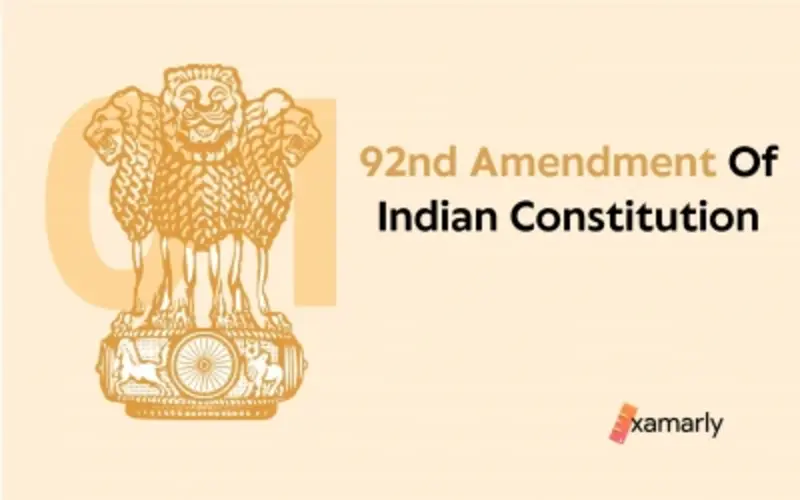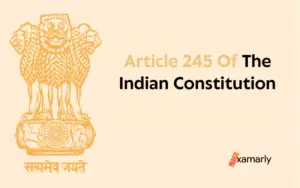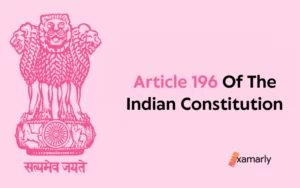Language is an essential component of how we express ourselves as humans. If that mode of communication or language is not acknowledged, both the people who use it and the language itself will be condemned to live in darkness forever.
Four additional languages were added to the Indian Constitution’s Eighth Schedule and given legal recognition as part of the Constitution (92nd Amendment of the Indian constitution) Act of 2003, which made an effort to somewhat solve this issue.
Read this article further to acknowledge which four languages are added and how this happens for your UPSC preparation.
Also, explore much more information related to the 92nd amendment of the Indian Constitution.
- 92nd Amendment of the Indian Constitution
- Salient Features and Facts
- Objects and Reasons
- 8th Schedule
- Significance of the 8th Schedule
- The Addition of Languages to the 8th Schedule
- Prominent People Involved
- Important Provisions
- Summing Up
- Frequently Asked Questions
- In which year was the 92nd amendment of the Indian constitution passed?
- Which Languages were included in the 8th Schedule of the Indian constitution after the 92nd amendment of the Indian constitution?
- The 92nd amendment of the constitution of India is also known by which name?
- What Is The Total Number Of Languages Recognized Under The 8th Schedule Of The Indian Constitution?
- What are the significant clauses of the Amendment?
- How did the 92nd Amendment of the Indian Constitution impact rural governance in India?
- What is the Panchayati Raj system in India?
- How does the Panchayati Raj system work in India?
92nd Amendment of the Indian Constitution
The 92nd Amendment of the Indian Constitution is also known as the Constitution (92nd Amendment) Act, 2003.
This amendment was an attempt toward providing national recognition to four languages, namely- Bodo, Dogri, Maithili, and Santhali.
To achieve this, the 8th Schedule of the Indian Constitution had to be revised. Four of these languages were added to the existing list of languages recognized as official languages.
With this addition, the list now held 22 constitutionally recognized languages. Read on further to learn more about the 92nd Amendment of the Indian constitution and the 8th Schedule of the Constitution of India.
Salient Features and Facts
- The Constitution (92nd Amendment) Act, of 2003 was introduced as the Constitution (100th Amendment) Bill in the Lok Sabha.
- It was passed by the Lok Sabha on December 22, 2003. Further, the Rajya Sabha passed the bill on December 23, 2003.
- Then President A.P.J. Abdul Kalam gave his approval on January 7, 2004. The act was enforced on the same day.
- This amendment was enforced in the 34th year of the Indian Republic by the Parliament of India.
- The 8th Schedule at present mentions 22 languages recognized as official languages.
- The initial number of official languages was 14. 8 languages were added to this list at different times due to certain constitutional amendments.
- The revision of the 8th Schedule was initially aimed at including the Bodo language in the list. However, Dogri, Maithili, and Santhali were given official language status due to the 92nd Amendment of the Indian constitution.
Objects and Reasons
The Statement of Objects and Reasons was included in the Constitution (100th Amendment) Bill, 2003, to revise the 8th Schedule to the Indian Constitution. The text of the Statement of Objects and Reasons has been explained below.
The need to revise the 8th Schedule to the Constitution was felt. This was due to the increasing demand to add certain languages to the list of official Indian languages.
It was suggested that Bodo be recognized as an official language. Therefore, Bodo needed to be added to the 8th Schedule.
The aforementioned goal is what the bill aims to accomplish.
8th Schedule
The names of all the official languages are contained in the 8th Schedule of the Indian Constitution. The 8th schedule is a very important part of the constitution because it determines which language is to be given official status and promoted by the government.
Currently, the 8th schedule includes 22 languages. Initially, there were only 14 languages included in the list. With several amendments, 8 new languages were added to the existing list. These languages are mentioned below:
Assamese, Bengali, Gujarati, Hindi, Kannada, Kashmiri, Malayalam, Marathi, Odia, Punjabi, Sanskrit, Tamil, Telugu, Urdu, Sindhi, Manipuri, Konkani, Nepali, Bodo, Dogri, Maithili and Santhali.
Significance of the 8th Schedule
The 8th Schedule to the Indian Constitution includes developed languages suitable for use across multiple domains. The Indian Government is obliged to actively promote these languages. The 8th Schedule also mentions articles 344(1) and 351.
These two articles include the 8th Schedule in the text of their provisions. They clearly state the duty of the Indian Government toward the growth and promotion of the languages included in the 8th Schedule.
These listed languages enjoy these privileges due to the provisions of articles 344(1) and 351.
The Addition of Languages to the 8th Schedule
To facilitate the addition of new languages to the 8th Schedule from time to time, some criteria were needed to remain fair and reasonable.
The Pahwa Committee formed in 1966 was the first initiative in this direction. Sri Ashok Pahwa, Secretary (OL), MHA was the Chairman.
In 2003, a similar committee named Mohapatra Committee was formed as a follow-up measure. It was headed by Sri Sitakant Mohapatra.
These committees used linguistic experts to create objective criteria for the addition of languages to the 8th Schedule.
In 2004, a report was submitted. The Mohapatra Committee faced diverting opinions regarding the objective criteria. Despite several meetings, the gap between divergent opinions could not be bridged.
Currently, the 8th Schedule has no criteria in place for the addition of new languages. After the inability of the Pahwa Committee and the Mohapatra Committee, no solid conclusion could be reached.
Having a set standard is a challenging task. Based on several factors such as the widespread use of a language, the evolution of dialects into languages, etc. the Indian Government might further add more languages to the 8th Schedule of the Indian Constitution.
Moreover, such factors are dynamic and rely on social, economic, and political events.
Relatable Articles: To know which other amendments of the Indian Constitution have added certain languages to the 8th Schedule, check out the linked article from the list mentioned below:
Prominent People Involved
To revise the 8th Schedule to the Indian Constitution, the bill of the 92nd amendment of the Indian Constitution was introduced by L.K. Advani.
He was serving as the Deputy Prime Minister at that time. The bill received its ultimate approval by then President A.P.J. Abdul Kalam.
Important Provisions
The 92nd Amendment of the Indian Constitution aimed to modify the 8th Schedule to the Constitution. Its important provisions have been listed below.
(a) entries “3. Bodo.” and “4. Dogri.” shall be added to the present entry 3. The revised entry 3 shall further be renumbered as entry 5;
(b) entries 4 to 7 shall be changed to entries 6 to 9, respectively;
(c) “10. Maithili.” shall be added to entry 8. The revised entry 8 shall further be renumbered as entry 11;
(d) entries 9 to 14 shall be changed to entries 12 to 17, respectively;
(e) “18. Santhali.” shall be added to entry 15. The revised entry 15 shall be renumbered as entry 19;
(f) entries 16 to 18 shall be renumbered. Entries 20 to 22 shall take their place, respectively.
New article 268A shall be inserted after article 268 of the Constitution. The new article introduces the service tax that is levied by the Union and the States. The collected and appropriated service tax is also included.
“268A. Service tax levied by Union. This is collected as well as appropriated by the States and the Union.-(1) the Government of India is shall be responsible to levy taxes on services. It shall also be responsible for its collection and appropriation, along with the States. Clause (2) provides the manner to do so.
(2) clause (1)mentions certain provisions. According to that, the proceeds of any tax levied in that financial year –
(a) the Government of India and the States shall collect it;
(b) the Government of India and the States shall appropriate it,
This is based on the principles of collection and appropriation. By law, the Parliament has the authority to formulate these principles.
Another important provision is the modification of article 270. In clause (1) of article 270 of the Constitution the substitution for the figures and words “articles 268 and 269” shall be made. They are to be substituted by letters, words, and figures as “articles 268, 268A, and 269”.
In addition to that, the 7th Schedule also needs to be modified. List I-Union List of the 7th Schedule to the Constitution needs revision. Entry 92B shall be followed by:-
“92C. Taxes on services.”.
Summing Up
The 92nd Amendment of the Indian Constitution is of utmost significance in addressing language issues by bringing minority languages to the forefront.
It gave minority languages the identity of an officially recognized language in the Constitution. This step was noteworthy as it helped to safeguard not just the primitive and native languages but also the interests of the speakers of the language.
Adding new ones to the existing major languages in the 8th Schedule is the acknowledgement and appreciation of cultural diversity in the nation.
Amendments such as the 92nd Amendment of the Indian constitution help to change society with time and ensure that the interests of the citizens are protected within a democratic nation.
Frequently Asked Questions
In which year was the 92nd amendment of the Indian constitution passed?
The 92nd Amendment of the Indian Constitution was passed on December 23, 2003. It was enforced from January 7, 2004.
Which Languages were included in the 8th Schedule of the Indian constitution after the 92nd amendment of the Indian constitution?
4 new languages were recognized as official languages after the revision of the 8th Schedule. They were Bodo, Dogri, Maithili, and Santhali.
The 92nd amendment of the constitution of India is also known by which name?
The 92nd Amendment of the Indian Constitution is officially known as the Constitution (92nd Amendment) Act, 2003.
What Is The Total Number Of Languages Recognized Under The 8th Schedule Of The Indian Constitution?
The 8th Schedule contains the names of languages of India that are constitutionally recognized. There are a total of 22 languages recognized as official languages.
What are the significant clauses of the Amendment?
The key provisions of the 92nd Amendment of the Indian Constitution include providing constitutional status to the Panchayati Raj institutions, reservation of seats for Scheduled Castes, Scheduled Tribes, and women in the Panchayati Raj institutions, and devolution of powers to these institutions.
How did the 92nd Amendment of the Indian Constitution impact rural governance in India?
The 92nd Amendment of the Indian Constitution had a significant impact on rural governance in India by providing constitutional recognition and greater autonomy to the Panchayati Raj institutions, which led to the empowerment of rural communities and the strengthening of grassroots democracy.
What is the Panchayati Raj system in India?
The Panchayati Raj system is a system of local self-government in India that was introduced by the 73rd Amendment of the Indian Constitution in 1992. It aims to decentralize power and promote grassroots democracy by establishing elected local bodies at the village, block, and district levels.
How does the Panchayati Raj system work in India?
The Panchayati Raj system in India works by establishing elected local bodies at the village, block, and district levels. These bodies are responsible for local governance and the provision of basic services such as water supply, sanitation, and health care.






